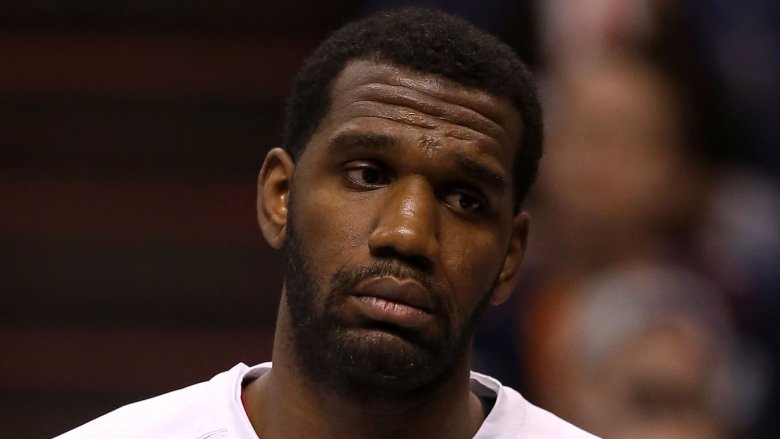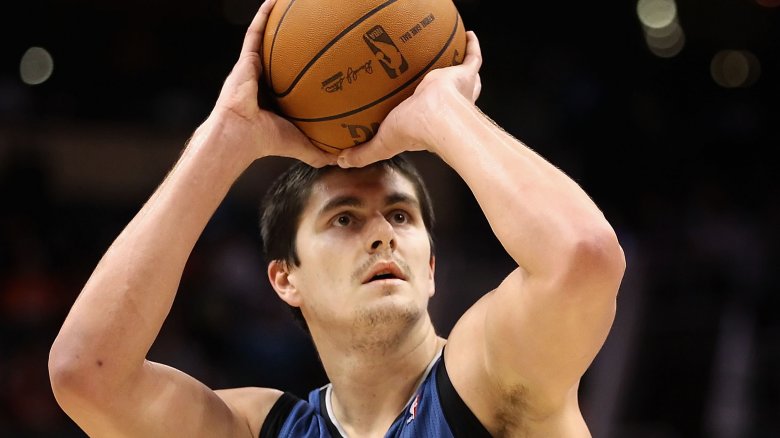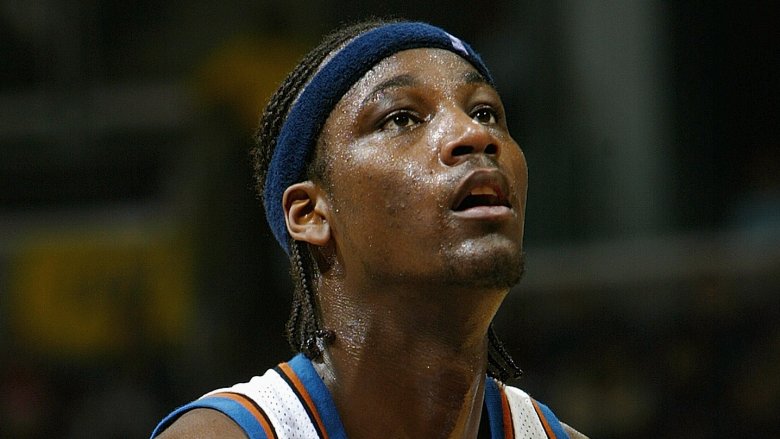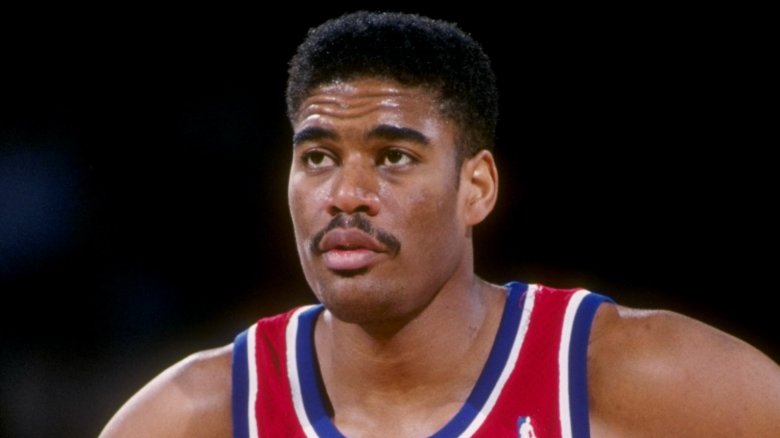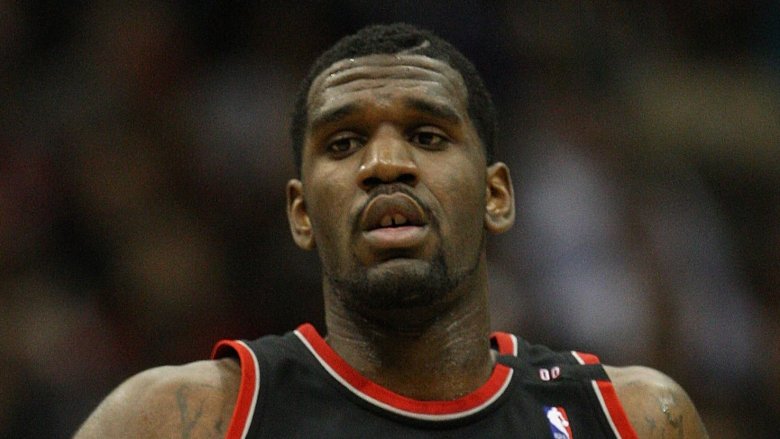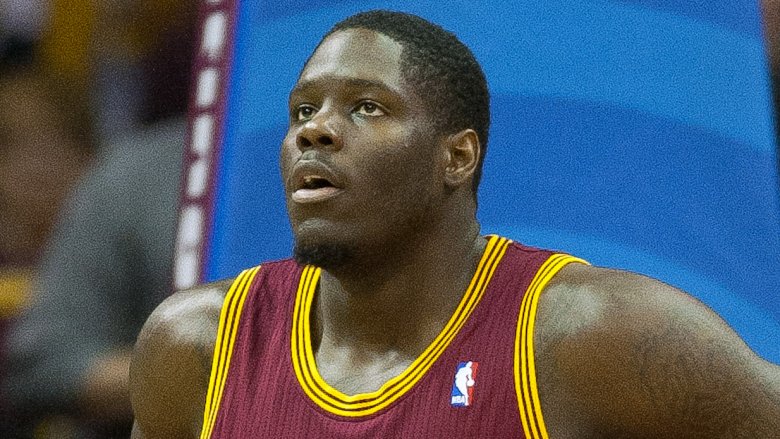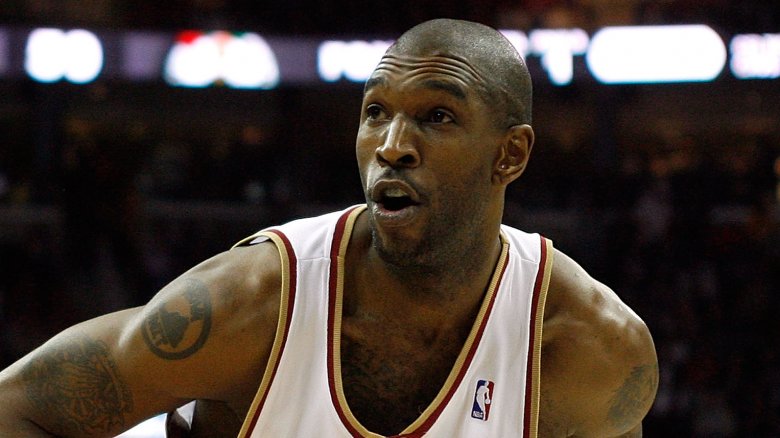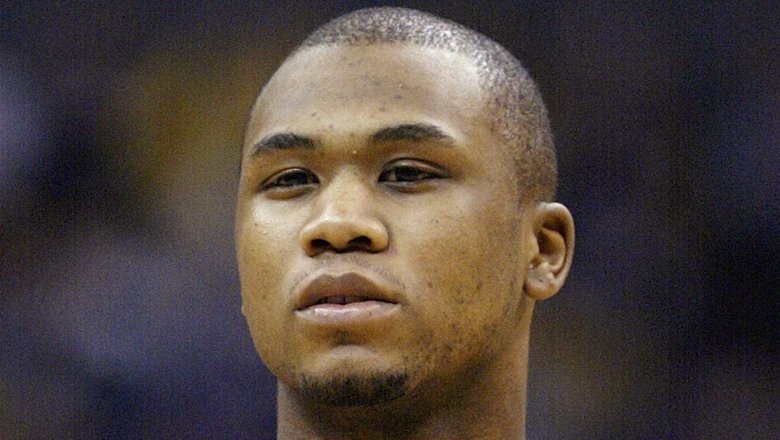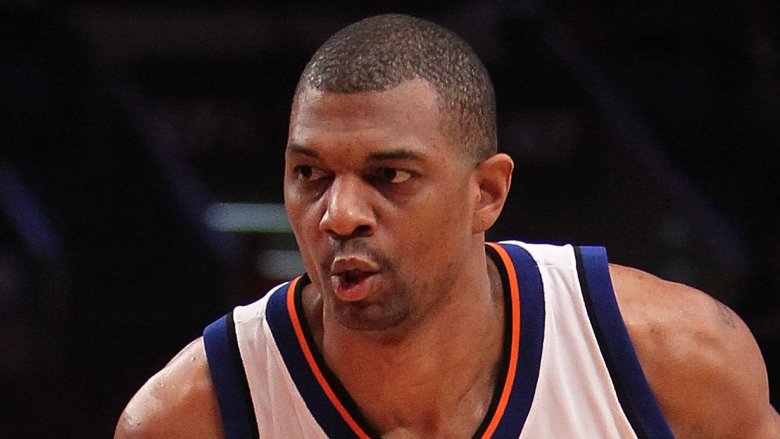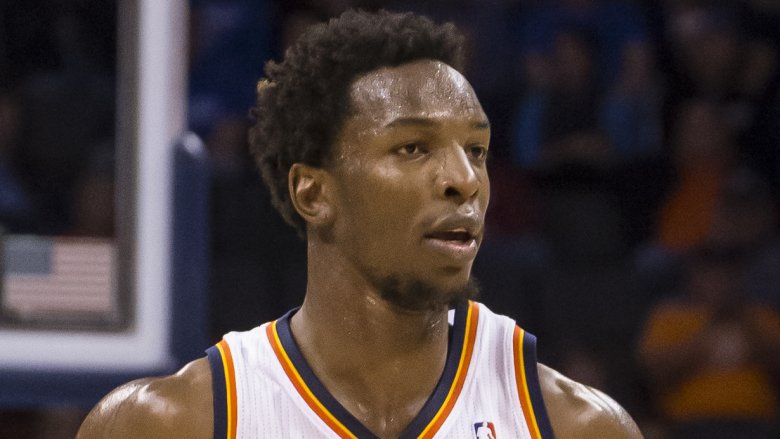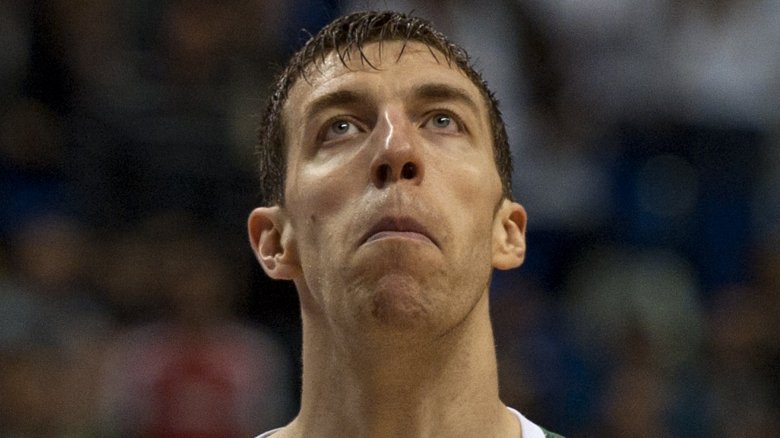NBA Top Draft Picks Who Completely Flopped
For professional sports teams, deciding which players to select with their handful of precious draft picks is akin to investing in stocks. Team executives do their research, just like stockbrokers would, such as reviewing video of potential players, examining scouting reports, and figuring out exactly how a straight-out-of-college (or high school, or international) player could help fill holes in the roster and win championships. But, as is true with stocks, there's a strong element of chance with the NBA Draft, because nobody can predict the future. (And maybe it's no coincidence that they call the top echelon of draft selections "the lottery.")
Often, a player selected at or near the top of the draft order goes on to huge, predictable success: guys like Shaquille O'Neal, Tim Duncan, and LeBron James, for example. Other times, teams chanced their draft picks on players whose biggest basketball-related claim to fame is that they were total busts. Here are some NBA players who didn't live up to the hype brought about by their high draft selection.
Darko who?
With the #2 pick in the 2003 NBA Draft, the Detroit Pistons almost couldn't lose. While the top-selected Cleveland Cavaliers had made well known their intention to select Ohio high school star LeBron James, Detroit still had its pick of potential all-stars like Carmelo Anthony, Chris Bosh, and Dwyane Wade. Pistons management ultimately selected 18-year-old Serbian center Darko Milicic. A 245-pound, 7' big man, Milicic had enough promise and potential to get the attention of NBA scouts but didn't really have the stats from two years with his team, Hemofarm Vrsac, to back it up — 7.6 points per game and 3.9 rebounds per game. At least his stats were consistent in the NBA: He played nine seasons for six teams, averaging a meager 6 ppg and 4.2 rpg. Pistons player-turned-executive Joe Dumars later admitted that mistakes were made. "After I drafted Darko, from that point on, the amount of background we do on every single player that you see us draft is ridiculous," he said. "We do as much or more background than any other team in the NBA because of that."
Kwame Brown was not among Michael Jordan's greatest achievements
Kwame Brown was essentially proclaimed the "next big thing" by the greatest ever. As president of basketball operations for the Washington Wizards, Michael Jordan drafted Brown with the #1 pick in the 2001 draft ... and then came out of retirement to play alongside his new protege. Jordan reportedly took an extremely tough approach to helping Brown hone his skills at the NBA level, including, according to the Washington Post, launching into an on-court explicit and homophobic-slur-laden tirade against his young charge. That strategy apparently didn't work — Brown played four lackluster seasons with the Wizards before being traded to the Los Angeles Lakers. In one of his years in D.C., Brown averaged 10.9 points per game, heights he would never reach again in a 12-year career that included stops in Memphis, Detroit, Charlotte, Golden State, and Philadelphia.
There is a happy ending for Brown, however. In 2017, he joined rapper and actor Ice Cube's BIG3, a three-on-three league largely staffed by former NBA players. He even played in the championship game with his team, the 3-Headed Monsters. (Hey, it's no worse a name than "Raptors.")
Here comes Pervis, at your service (until he wasn't)
For his ability to seriously produce under pressure, Louisville star Pervis Ellison earned the nickname "Never Nervous Pervis" en route to a national championship. The Sacramento Kings were certain he'd turn the traditionally lowly franchise around, and took him with the #1 pick in the 1989 NBA Draft, overlooking future NBA standouts like Glen Rice, Vlade Divac, and Tim Hardaway. But alas, it wasn't meant to be for the possibly cursed Kings — "Never Nervous Pervis" evolved into "Out of Service Pervis" almost immediately, playing in less than half of his rookie season because of injuries. After that one season in northern California, the Kings traded Ellison to the Washington Bullets, where he got a lot better, averaging around 10 points a game in 1990-91, and a stellar 20 in 1991-92, the year he was named the NBA's "Most Improved Player." While a #1 draft pick should never be in a position to go from terrible to pretty good, that was Ellison's last stab at greatness. His production rapidly diminished, and he warmed the bench for Boston and Seattle before quietly retiring in 2001. (P.S. The Kings still haven't won a championship.)
Greg Oden dashed Portland's hopes
In 1984, and in need of a center, the Portland Trail Blazers drafted the reliably productive Sam Bowie with the #2 pick ... passing up the chance to grab some guy named Michael Jordan. It's a decision that haunted the team when Jordan went on to win six championships, but in 2007, it looked like the Blazers might break the "curse." After landing the #1 pick in that year's draft, the team selected Greg Oden out of Ohio State. A consensus All-American, he averaged 15.7 points per game and led the Buckeyes to the Final Four. But when the 2007-08 campaign began, Oden wasn't there to play it, as he required last-minute knee surgery. He missed the whole season.
When he took to the court in 2008, Oden had a slow but promising start, averaging about 9 points over 60 games. (That's after his first game, which saw him leave the game with a foot injury after 13 minutes, leading to two weeks on the bench.) Things finally got started in November 2009, but then Oden, averaging nearly 13 points at the time, saw a fractured kneecap end his season. A year later, he required another knee surgery, and he wouldn't hit the court until three years after that, in 2013. In his 23 games for the Miami Heat, he scored about 3 points on average. And that was the end of Greg Oden's professional career.
Not quite LeBron 2.0
Nine years after winning the NBA equivalent of the Powerball jackpot — the #1 slot in the year that LeBron James declared — Cleveland once again found itself with the top pick in the NBA Draft. Unfortunately, lightning didn't strike again for the Cavs. Their selection: Anthony Bennett, a versatile forward out of UNLV. While many other high pick-busts show some initial promise before plateauing, Bennett didn't do that. In his rookie year, Bennett averaged about 4 points and 3 rebounds a game. In fact, "four" seems to be the magic number for Bennett's career because that's the total number of seasons he lasted in the NBA, and the number of teams he played for in that frame. At least when the Cavaliers dealt him away in 2014, they got Kevin Love in return.
Why was Bennett such a non-starter? According to former Cavaliers GM David Griffin in Jason Lloyd's book The Blueprint, Bennett's career was a non-starter because Bennett wasn't a self-starter. "The issue with Anthony was, and we had no way of knowing it at the time," Griffin said, "the kid had no desire to overcome adversity whatsoever. As soon as it was hard, he was out."
Okay name, okay career
If there was a draft of all-time NBA players with the most generic names, Joe Smith would go #1, just like he did (to the Golden State Warriors) in the actual NBA Draft in 1995. A little sports math might suggest that Smith, at #1, was five times better than the #5 selection, Kevin Garnett, but, unfortunately for Smith (and the Warriors), draft math is about as real as that generic names draft.
Smith did go on to have an incredibly long NBA career — 16 seasons — during which he played for 12 different teams, a tie for the record. Otherwise, Smith wasn't really a record-breaking kind of guy. He was named to the NBA's All-Rookie team after his first season, the first strike in a solid workmanlike career. Smith's average scoring reached double digits in eight seasons and he was a reliable rebounder. In other words, the kind of stats one would expect from a second-round pick ... not the #1 selection.
The painful ordeal of Dajuan Wagner
On March 2, 1962, Wilt Chamberlain scored 100 points in an NBA game. On January 16, 2001, Dajuan Wagner achieved that same tally for Camden High School in New Jersey. Sure, high school ball isn't the same competitive level as the pros, but it's an impressive feat nonetheless. Wooed to the University of Memphis, Wagner scored more than 21 points per game on average and led the team to an NIT championship as a freshman. After a year of college ball, Wagner figured he was good enough for the NBA, and the NBA agreed — the Cleveland Cavaliers nabbed him with the #6 pick in the 2002 NBA Draft.
As a rookie, Wagner averaged a pretty good 13 points and nearly 3 assists over 47 games. And then the injuries and health problems hit — he required knee surgery and had to deal with colitis, a condition characterized by the inflammation of the colon. He missed the vast majority of games from 2003 to 2005, and he didn't play at all in 2005-2006 — he needed to recover from colon removal surgery. In 2006, he left the Cavaliers and signed with the Golden State Warriors. Having lost more than 30 pounds due to his health problems, Wagner played in one game for his new team, but after a mid-game dizzy spell, the team bought out his contract and he was out of the NBA.
Jonathan Bender unfortunately peaked in high school
Some of the best players in recent NBA history were drafted straight out of high school, superstars in the making who decided to go pro instead of spending a few years in the league's non-paying, de facto farm system of college basketball. Among them: Kevin Garnett, Kobe Bryant, and Dwight Howard. Not among that handful of greats: Jonathan Bender.
Of course, the Toronto Raptors certainly thought that they were putting into motion an extra-long and storied career when they took Picayune (Mississippi) Memorial High School forward Jonathan Bender with the fifth pick in the 1999 draft. He'd recently put on a show on a national stage, scoring a record 31 points in the McDonald's High School All American Game. Before the 1999-2000 season began, the Raptors sent Bender to Indiana in exchange for Antonio Davis. Bender gave the Pacers seven partial seasons of little production. After playing only two games in the 2005-06 season, 25-year-old Bender's perpetual and painful knee problems forced him into an early retirement. "Due to a medical condition in my knees, I will not be able to continue playing basketball," he said in a statement in early 2006. But to his credit, Bender found that retirement didn't suit him, and in 2009 — after three years away from the NBA — he joined the New York Knicks for one final, quiet season.
At least Hasheem Thabeet is big in Japan
At 7'3" and 263 pounds, Hasheem Thabeet was an especially big — and effective — big man for the University of Connecticut from 2006 to 2009. The Tanzania-born center shared the Big East Player of the Year award in 2008-09, when he put points on the board (13.6 ppg), pulled down rebounds (10.8 per game), and blocked shots (4 per game, on average). Based on all that, it was not that dumb for the Memphis Grizzlies to nab Thabeet with the #2 pick in 2009 NBA Draft. But Thabeet's style of play just didn't play in the NBA. That, along with injury issues, led to career averages of 2.2 points per game, 2.7 rebounds per game, and just 0.8 blocks per game.
In going all in on Thabeet (who went on to play in Japan) the Grizzlies passed on James Harden and Steph Curry — both future MVPs.
Fran Vázquez didn't even show up
Not everybody who's good at basketball dreams of playing in the NBA, the top professional league of the United States (and Canada). Take, for example, Fran Vázquez. A rising star in the EuroLeague (in Europe, obviously) in the early 2000s, the Spanish-born center closed out the 2004-05 season averaging 10 points a game and 5.4 rebounds. That was a standout year in a career that ultimately placed him atop the all-time blocks leaders list in the EuroLeague. The Orlando Magic liked what they saw, and with the #11 pick in the 2005 draft, selected Vázquez.
Look, not every player drafted can go on to become the next Michael Jordan, but at least every player here did what very few people do, and got paid a lot of money to play in the NBA. But not Vázquez. The Magic completely wasted their draft pick on the guy because he never signed with the team, and thus never set foot on an NBA court, choosing to stay and play in Europe instead.
